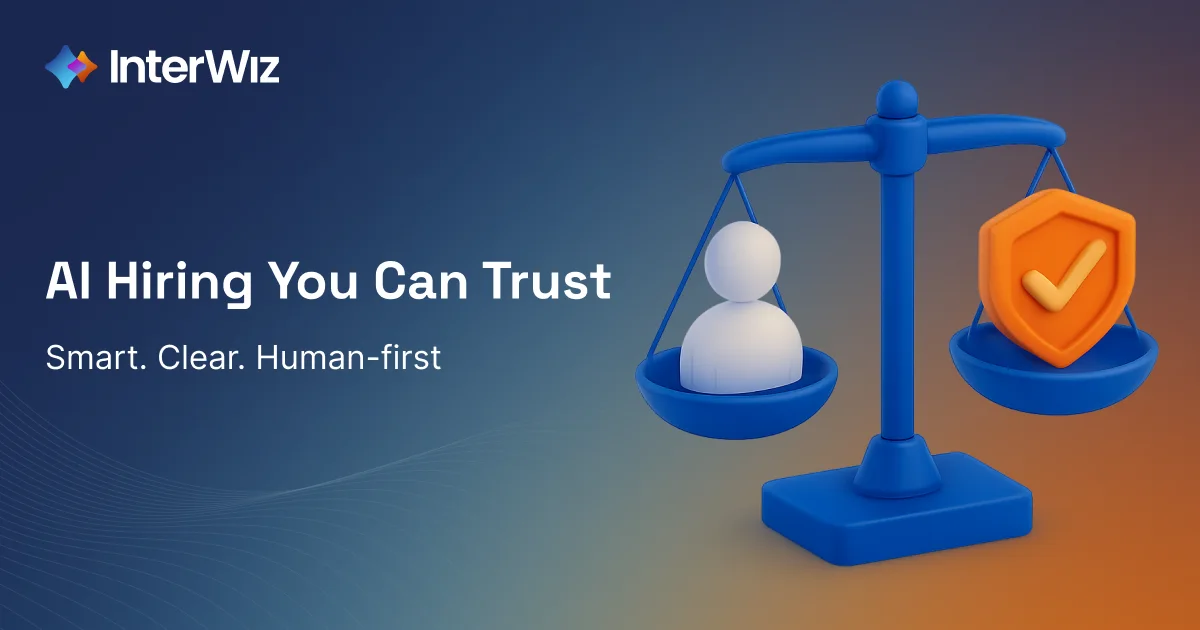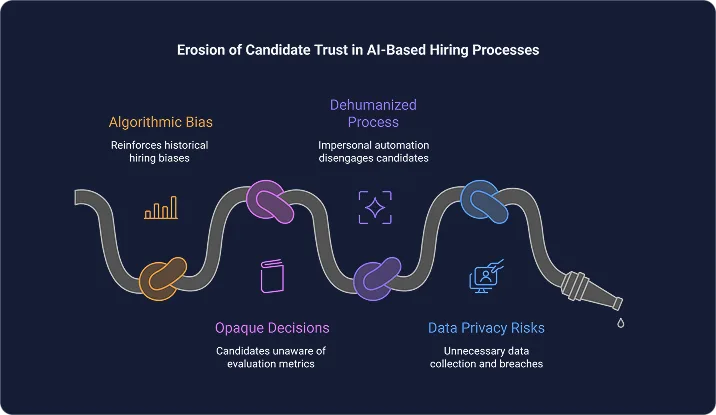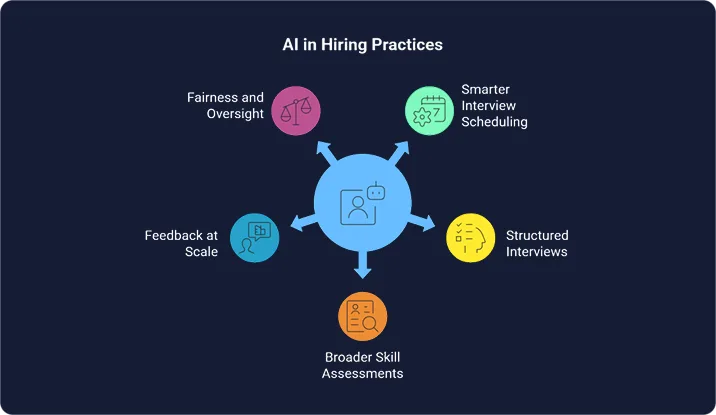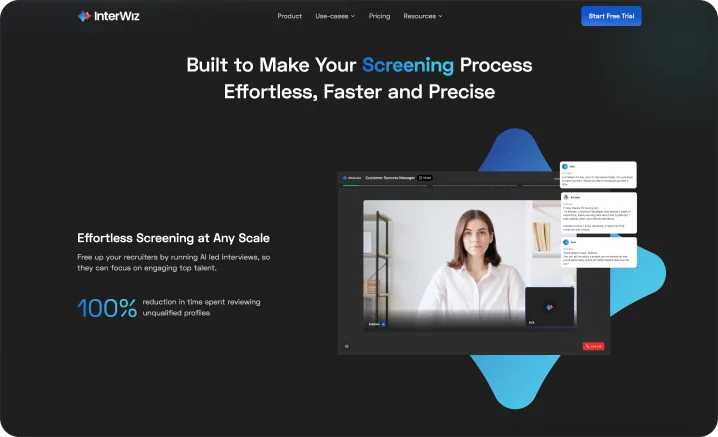Hiring Best Practices | Candidate Experience
How to Use AI in Hiring Without Breaking Candidate Trust

AI now touches nearly every step of the hiring process. It delivers efficiency, but it also introduces new risks for candidate trust. Many candidates worry they are being judged by an algorithm instead of a recruiter.
This concern carries real business consequences. A recent Capterra survey found that 38% of job seekers might feel hesitant to accept an offer if the entire hiring process relies heavily on AI. When candidates disengage, the result isn’t just lower offer acceptance. You lose top talent to faster-moving competitors, and the efficiency gains you expected from AI disappear.
The challenge is not whether to use AI, but how to use it without losing candidate confidence. This article will show you where trust breaks down, the principles that keep AI transparent and fair, and the applications that strengthen trust while improving efficiency.
Key Takeaways
Candidate trust is the real measure of AI success. Many job seekers disengage when hiring feels opaque or impersonal, even if automation speeds things up.
Transparency, feedback, and human oversight turn AI into an asset. Recruiters who apply these principles reduce drop-offs and improve offer acceptance.
InterWiz proves efficiency and trust can coexist. Its structured interviews, resume screening, skill-based assessments, and transparent reports show how AI can support recruiters while giving candidates confidence in the process.
Why Candidate Trust Is at Risk With AI in Hiring
Candidate trust is fragile when AI enters hiring. A Gartner survey found only 26% of job seekers trust AI to evaluate them fairly, while 25% said its use would make them trust an employer less. For recruiters, that skepticism translates into higher drop-offs, declined offers, and reputational damage.
Here are the main risks recruiting teams need to recognize:

1. Bias Baked Into Algorithms
AI learns from historical data. If past hiring favored certain schools or demographics, those patterns can be reinforced. Amazon’s discontinued AI recruitment tool, which disadvantaged women, remains the clearest warning of how bias can scale.
2. Opaque “Black Box” Decisions
Many tools filter or reject candidates without explanation. Lack of transparency leaves applicants frustrated, unsure if they were judged on merit or arbitrary signals. This uncertainty erodes trust even if the underlying scoring is consistent.
3. Dehumanized Process
Over-reliance on chatbots, automated rejections, or rigid assessments makes hiring feel impersonal. Candidates who can’t demonstrate soft skills or cultural fit often disengage, assuming the process doesn’t value their full potential.
4. Data and Privacy Risks
Some AI hiring tools collect more personal information than needed, sometimes scraping social profiles without consent. Combined with the risk of breaches, this raises ethical and legal concerns that can damage an employer’s reputation.
For recruiters, the lesson is clear: efficiency alone won’t win candidates. Without transparency, fairness, and human connection, AI becomes a liability instead of an advantage.
Principles for Using AI in Hiring Without Breaking Candidate Trust
AI hiring speeds up resume screening and interviews, but trust only grows if recruiters apply it with clear guardrails. Without them, automation risks bias, legal challenges, and candidate drop-offs. Here are the key principles every recruiter should follow:
Keep human oversight: Use AI tools for high-volume tasks like resume screening or interview scheduling, but keep recruiters in control of final decisions. Candidates feel more confident when a person, not just an algorithm, reviews results.
Prioritize transparency: Let applicants know upfront where AI is used, whether in screening or interviews. If a hiring tool provides a score, be ready to explain what factors shaped it. This clarity turns skepticism into confidence.
Audit for fairness: AI reflects the data it’s trained on. Conduct regular bias checks, anonymize resumes where possible, and track outcomes by demographic group. Some jurisdictions, like New York City, already require these audits.
Safeguard candidate data: Collect only what’s necessary for hiring, secure it with encryption, and be transparent about how long it will be stored. Over-collecting or mishandling data risks trust and compliance penalties.
Establish accountability: Define who monitors AI hiring tools and how candidates can request a human review. Clear responsibility prevents automation errors from damaging your employer brand.
For recruiters, the takeaway is simple: AI builds trust when it stays transparent, audited, and accountable, and when humans make the final call.
Practical Applications of AI Hiring That Build Candidate Confidence
AI builds candidate trust when it’s applied in ways that are visible, fair, and transparent. Here’s how recruiters can use it effectively:

Smarter Interview Scheduling
Delays frustrate job seekers and slow down recruiters. AI scheduling tools let candidates choose interview times that fit their calendars, eliminating back-and-forth emails and creating a smoother first impression.
Structured and Consistent Interviews
AI delivers the same set of core questions to every applicant, ensuring fairness. Follow-up questions then adapt to candidate responses, keeping the process both structured and personalized. InterWiz supports this with interview templates designed to minimize bias.
Broader Skill Assessments
AI can evaluate technical, analytical, and communication skills, not just resume keywords. Some platforms anonymize resumes or use gamified assessments to ensure merit-based evaluation. InterWiz combines all three skill types in a single flow, giving candidates confidence that they’re judged on their full ability.
Feedback at Scale
Candidates often leave hiring processes without feedback, which damages trust. AI can generate transcripts, scoring summaries, and reports automatically. Talent Board research found that finalists who receive feedback are over 53% more likely to refer others. InterWiz provides clear post-interview reports that explain decisions.
Built-In Fairness and Oversight
Recruiters should audit AI outputs regularly to catch bias and keep final decisions in human hands. This balance of automation and judgment shows candidates that efficiency doesn’t come at the expense of accountability.
For recruiters, the message is clear: apply AI in ways candidates can see and understand. Transparency, fairness, and human oversight turn efficiency gains into genuine trust.
How InterWiz Builds Candidate Trust in AI Hiring
Many AI hiring tools focus only on efficiency, but InterWiz was designed to balance automation with transparency. Its approach directly addresses the risks that make candidates skeptical of AI-driven hiring.

Resume Screening: InterWiz uses AI to quickly filter large volumes of job applications. Candidates are screened against structured criteria rather than vague keywords, ensuring that qualified applicants aren’t overlooked. Recruiters save time, and candidates see a fairer path through the first stage of the hiring process.
Structured Interviews: Every candidate begins with the same set of interview questions, ensuring consistency. Follow-ups adapt to responses, keeping the process both fair and personalized.
Broader Skill Assessments: InterWiz evaluates technical ability alongside soft skills like communication and analytical skills, such as problem-solving. This gives candidates confidence that they are judged on their full ability, not just a resume keyword.
Transparent Reports: After each interview, recruiters receive transcripts, scoring, and insights. Candidates benefit too, leaving the process with clarity about how decisions were made.
Human Oversight: InterWiz ranks candidates only after interviews are complete, and recruiters can adjust weightings. This ensures AI supports decision-making without replacing recruiter judgment.
The result is straightforward: recruiters gain efficiency while candidates experience the process as fair and transparent. Trust grows because automation is paired with structure, feedback, and human review.
Bottom Line: AI-Driven Hiring That Builds Candidate Confidence
AI will remain central to the hiring process, but candidate trust decides whether it succeeds. Job seekers accept automation when it makes hiring faster and fairer. They reject it when it feels hidden, biased, or impersonal.
Recruiters who pair AI tools with transparency, feedback, and human oversight see better results. Time-to-hire improves, costs go down, and candidates leave with confidence in the process.
The message is clear: AI should not replace recruiters. It should give them the structure and scale to hire more efficiently while earning candidate trust.
FAQs about Using AI Hiring Without Breaking Candidate Trust
How do candidates know AI is being fair?
Transparency is key. Explain where AI is used, audit algorithms for bias, and share feedback reports. When applicants see consistent criteria and clear reasoning, they view the system as fair.
What roles are best suited for AI interviews?
AI interviews work well in high-volume hiring and for roles that require consistent evaluation, such as technical positions, customer support, or entry-level jobs. Structured AI interviews also help test soft and analytical skills in a scalable way.
Does AI introduce more bias into hiring?
It can if left unchecked. Algorithms reflect the data they are trained on. Regular audits and fairness reviews are essential to prevent algorithmic bias and to ensure diverse candidates are not excluded.
How can AI improve the candidate experience?
AI reduces delays with scheduling, standardizes interview questions, and provides structured feedback. Job seekers appreciate faster responses and clear insights, which build confidence in the process.
What information should recruiters share about AI use?
At a minimum, let candidates know when AI is used for resume screening, interview structuring, or assessments. Clear explanations show respect for applicants and reduce uncertainty.
Is AI suitable for senior or executive hiring?
AI can support parts of the process, like scheduling and initial screening. But senior roles still require deeper human judgment, cultural alignment checks, and strategic conversations that AI cannot replace.

High Quality Screening with AI Interviews
Automated interviews built for speed, scale, and accuracy.
🔥 Full features, no credit card required.